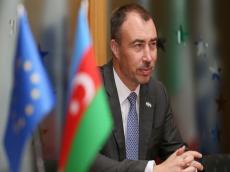|
|
TODAY.AZ / Politics
Toivo Klaar’s statement leaves no hope for Europe’s peace initiative
06 August 2024 [08:30] - TODAY.AZ
 Elnur Enveroglu
Elnur Enveroglu
European and Western institutions have once again shown their true intentions by acting from their biased positions. From 2020 until today, the political agents of Europe, suffering from serious anxiety syndrome, can neither calm down nor retreat from their pro-Armenian positions.
Toivo Klaar, EU Special Representative for the South Caucasus and the Crisis in Georgia, was remembered for a very regrettable step when he was about to leave his 10-year term. In fact, it is not something new that we witness in this region, but at least being honest once in life when especially completing the service, would be a generous step.
Toivo Klaar's biased comment also spontaneously invalidates the meetings held by Europe, either in Brussels or in the United States, under the name of "peace platform". The unjust position of the EU Special Representative literally breaks the balance of the scales of justice.
Klaar says that the EU did not play an active role in Azerbaijan-Armenia relations until 2020. His role was mostly to support the "work" of the former Minsk Group co-chairs. The activity of the European Union started mostly after 2020, i.e. after the period when Azerbaijan liberated its territories from Armenian occupation during the Patriotic War.
Does the West seem to be more aggressor than Armenia?
Undoubtedly, the fact that Azerbaijani territories were once under occupation could not worry the West as much as it does now. Western and European institutions, organizations, and politicians thought that time was in their favour until a war broke out in Garabagh with Armenia’s provocations. They believed that the Garabagh conflict would be permanently frozen and the conflict status would be removed after some time.
However, Azerbaijan's changing geostrategic situation in the South Caucasus disappointed the parties and even made them suffer from anxiety syndrome.
Realities behind West’s "Peace Talks Platform"
Although the Garabagh conflict ended with the victory of Azerbaijan in the just struggle, the Western side still refuses to comply with realities. The negotiation process, which is deliberately prolonged, either is cancelled with an excuse every time, or remains fruitless until the next negotiation process thrown by a third party for Armenia’s favour. For example, the West, which said that the processes between Armenia and Azerbaijan were progressing positively after the last negotiations, soon brought up the unnecessary issue of the release of separatist criminals imprisoned in Baku at the request of Armenia. Later, it led to a baseless accusation against Baku, regarding Armenians who voluntarily moved from Garabagh to Armenia. Toivo Klaar's comment is part of these unjust statements. He does not mention the fate of Azerbaijanis who were displaced from current Armenian territories in the late 1980s and from Garabagh following the first Garabagh War in the 1990s. His biased position pushes beyond Armenia's claims.
Nevertheless, why so much zeal, and so much initiative in peace negotiations? Maybe it is time to make the position clear and say who is with which side and what they are serving.
It turns out that Armenia gains time with the support of their European allies by prolonging the negotiation process. However, Baku is blamed when things go wrong and do not match the plan of Western institutions.
The European representative is already preparing to hand over his post to his new colleague, and the Council appoints Magdalena Grono as EUSR for the South Caucasus and the crisis in Georgia. And we still try to find answer to the question of whether this will change anything, or is it worth believing that the arrival of the new representative will bring a positive atmosphere to the region?
URL: http://www.today.az/news/politics/251431.html
 Print version
Print version
Connect with us. Get latest news and updates.
See Also
- 05 April 2025 [17:10]
Azerbaijani Defense Minister holds high-level military service meeting - 05 April 2025 [16:35]
Azerbaijan, Pakistan brainstorm interparliamentary relations - 05 April 2025 [16:20]
President of Uzbekistan makes phone call to President Ilham Aliyev - 05 April 2025 [13:25]
Euronews highlights Azerbaijan’s landmine challenges in special report - 05 April 2025 [12:47]
Relocation to Suqovushan village begins: 53 families to move - 05 April 2025 [10:00]
Briefing dedicated to humanitarian mine action in Azerbaijan held at UN - 04 April 2025 [14:34]
Azerbaijan, Russia mark 33rd anniversary of diplomatic ties with renewed commitment to alliance - 04 April 2025 [13:21]
Landmine toll reaches 388 in post-war Azerbaijan - 04 April 2025 [12:58]
Trial of Armenian-origin individuals accused of war crimes continues in Baku - 04 April 2025 [11:59]
Azerbaijan slams Armenia over unreliable landmine maps, urges international action
Most Popular
 Turkiye to introduce parental consent for social media users under age of 16
Turkiye to introduce parental consent for social media users under age of 16
 UK, Poland and Northern Europe want to create joint defense fund
UK, Poland and Northern Europe want to create joint defense fund
 Azerbaijan, Russia mark 33rd anniversary of diplomatic ties with renewed commitment to alliance
Azerbaijan, Russia mark 33rd anniversary of diplomatic ties with renewed commitment to alliance
 How Donald Trump’s tariff impacts Azerbaijan’s trade with US [COMMENTARY]
How Donald Trump’s tariff impacts Azerbaijan’s trade with US [COMMENTARY]
 Underperformer strikes back
Underperformer strikes back
 Pezeshkian’s visit to Baku comes at critical time for Azerbaijan-Iran relations
Pezeshkian’s visit to Baku comes at critical time for Azerbaijan-Iran relations
 China deeply regrets, rejects Fitch Ratings downgrade
China deeply regrets, rejects Fitch Ratings downgrade
